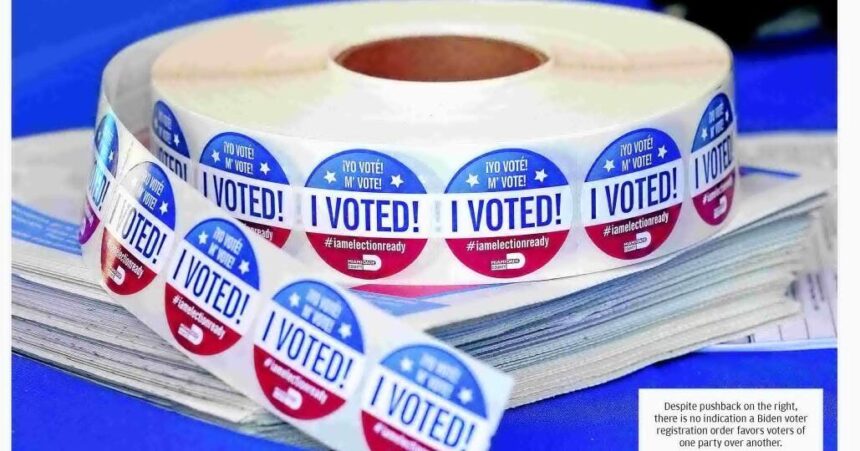Republicans and conservative activists have been increasingly criticizing an executive order issued by the Biden administration three years ago aimed at enhancing voter registration. They claim it is unconstitutional and an attempt to influence the upcoming election in November.
A GOP political action committee recently sent a fundraising email framing the order as a directive for federal agencies to promote Biden’s election efforts. A Republican-controlled House committee has issued subpoenas to agency directors, and a group of GOP secretaries of state has asked the Supreme Court to review a case challenging the order.
Despite the opposition from the right, there is no evidence that the order favors one party’s voters over another.
People are also reading…
White House spokesperson Robyn Patterson stated that the administration will continue to safeguard the voting rights of eligible citizens regardless of their political affiliation. Biden issued the order in 2021 amidst debates in GOP-led legislatures across the country about state voting restrictions and false claims of widespread fraud impacting former Republican President Donald Trump’s reelection.
Here’s an overview of what the order entails, how federal agencies have implemented it so far, and the criticisms from Republicans.
Objective of the Order
Biden signed the executive order on March 7, 2021, emphasizing the government’s responsibility to simplify voter registration and voting for all eligible individuals. The order called for compliance with applicable laws and required agency leaders to submit strategic plans within 200 days.
The order mandated updates to the federal website vote.gov to provide voting information in multiple languages. The website does not directly register voters but connects visitors with state and local election offices to initiate the registration process.
Specifically, the order instructed the Department of Defense to establish procedures enabling active-duty military personnel to register, update their information, or request absentee ballots annually.
It also directed the Department of Justice to offer educational materials on registration and voting to individuals in federal custody, informing them about voting restrictions they might face upon release.
Republican Concerns
A year after the order was issued, congressional Republicans raised objections, alleging that the administration overstepped its authority and directed federal agencies to engage in activities beyond their scope. They noted that the U.S. Department of Agriculture communicated to state agencies that voter registration services’ costs were allowable under the Supplemental Nutrition Assistance Program.
However, a former White House official involved in implementing the order clarified that states administer the program and were directed by federal law to provide voter registration information. The official emphasized that the agency was reiterating existing guidance on reimbursable expenses.
Subsequently, Republicans requested information from federal agencies about their compliance plans and included the repeal of the executive order in a comprehensive elections bill introduced last year.
In May, the Chairman of the Committee on House Administration issued subpoenas after federal agencies were asked for documents related to the order. Wisconsin Republican Rep. Bryan Steil criticized the order as an attempt by the Biden Administration to influence the 2024 elections.
A White House official mentioned that the Office of Management and Budget had responded initially, and other agencies were working on complying with the committee’s requests when the subpoenas were issued.
State Cooperation is Essential
Although federal agencies have not disclosed their proposals, they have announced steps taken to adhere to the order.
Legal expert Justin Levitt described the order as groundbreaking but with limited scope. He noted that while federal law allows agencies to support voter registration, only military recruitment offices were doing so before Biden’s executive order. Additionally, federal agencies can engage in such activities only upon a state’s request.
States like Kansas and New Mexico have designated Native American colleges to serve as voter registration agencies, while Kentucky and Michigan plan to designate Veterans Administration offices, with Michigan also including Small Business Administration offices.
GOP Secretaries of State Challenge the Order
Several Republican secretaries of state have criticized the order for federal intrusion into states’ election administration. West Virginia Secretary of State Mac Warner urged Biden to rescind the order, testified against it before Congress, and declared that his state will reject voter registration forms collected by federal agencies.
In May, Warner joined other GOP secretaries of state in filing a brief with the U.S. Supreme Court, requesting them to review a case challenging the order. The secretaries of state represent Arkansas, Indiana, Louisiana, Mississippi, Montana, New Hampshire, Tennessee, and Wyoming.
The Supreme Court declined to expedite the case, delaying consideration until the fall. If the court decides to hear the case, arguments are unlikely to occur before early next year.
‘Innocuous as an order gets’
Opponents of the executive order have dubbed it “Bidenbucks,” alluding to the controversy surrounding Mark Zuckerberg’s funding of election operations after the 2020 election. They claimed that the initiative, known as “Zuckerbucks,” favored Democrats.
David Becker, a former Justice Department lawyer, dismissed the heightened criticism of the order years after its issuance and close to the upcoming presidential election. He emphasized that the order aims to facilitate voter registration for eligible citizens engaging with the federal government, describing it as harmless.





